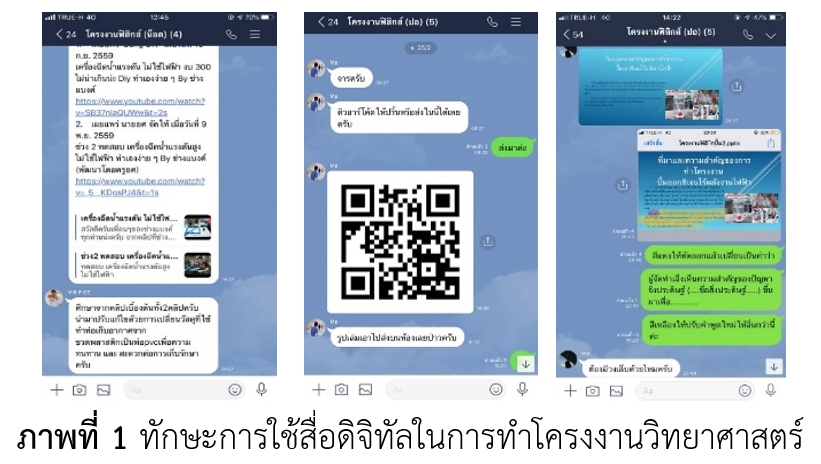ผลการใช้สื่อดิจิทัลประกอบการจัดการเรียนรู้โดยใช้โครงงานเป็นฐานในรายวิชาฟิสิกส์สำหรับนักเรียนชั้นมัธยมศึกษาปีที่ 5
Main Article Content
บทคัดย่อ
การวิจัยครั้งนี้มีวัตถุประสงค์ เพื่อพัฒนากิจกรรมการจัดการเรียนรู้โดยใช้โครงงานเป็นฐานร่วมกับการใช้สื่อดิจิทัล เรื่อง ของไหล ให้มีประสิทธิภาพเป็นไปตามเกณฑ์มาตรฐาน 75/75 เปรียบเทียบผลสัมฤทธิ์ทางการเรียน ก่อนเรียนและหลังเรียน และศึกษาความสามารถในการใช้สื่อดิจิทัลในการทำโครงงานวิทยาศาสตร์กับเกณฑ์ที่กำหนดร้อยละ 75 กลุ่มตัวอย่างคือ นักเรียนชั้นมัธยมศึกษาปีที่ 5 ภาคเรียนที่ 2 ปีการศึกษา 2561 โรงเรียนเบญจมราชรังสฤษฎิ์ จำนวน 44 คน ได้มาโดยการสุ่มตัวอย่างแบบกลุ่ม เครื่องมือที่ใช้ในการวิจัย ได้แก่ แผนการจัดการเรียนรู้แบบโครงงานเป็นฐานร่วมกับการใช้สื่อดิจิทัล แบบทดสอบวัดผลสัมฤทธิ์ทางการเรียน เรื่อง ของไหล และแบบประเมินความสามารถในการใช้สื่อดิจิทัลร่วมกับการทำโครงงานวิทยาศาสตร์ การวิเคราะห์ข้อมูลใช้สถิติเพื่อทดสอบสมมติฐานโดยการทดสอบค่าทีแบบตัวอย่างไม่อิสระต่อกันเพื่อเปรียบเทียบผลสัมฤทธิ์ทางการเรียน และการทดสอบค่าทีสำหรับตัวอย่างกลุ่มเดียวสำหรับวิเคราะห์ความสามารถในการใช้สื่อดิจิทัลในการทำโครงงานวิทยาศาสตร์ ตามลำดับ ผลการวิจัยพบว่า แผนการจัดการเรียนรู้ที่พัฒนาขึ้นมีประสิทธิภาพ 76.68/78.71 เป็นไปตามเกณฑ์มาตรฐาน 75/75 นักเรียนมีผลสัมฤทธิ์ทางการเรียนหลังเรียน (Mean 23.61, S.D. 1.62) สูงกว่าก่อนเรียน (Mean 10.23, S.D. 1.85) อย่างมีนัยสำคัญทางสถิติที่ระดับ .05 และมีความสามารถในการใช้สื่อดิจิทัลในการทำโครงงานวิทยาศาสตร์ (78.80%) เป็นไปตามเกณฑ์ที่กำหนดร้อยละ 75
Article Details
วารสารวิทยาศาสตร์และวิทยาศาสตร์ศึกษา (JSSE) เป็นผู้ถือลิสิทธิ์บทความทุกบทความที่เผยแพร่ใน JSSE นี้ ทั้งนี้ ผู้เขียนจะต้องส่งแบบโอนลิขสิทธิ์บทความฉบับที่มีรายมือชื่อของผู้เขียนหลักหรือผู้ที่ได้รับมอบอำนาจแทนผู้เขียนทุกนให้กับ JSSE ก่อนที่บทความจะมีการเผยแพร่ผ่านเว็บไซต์ของวารสาร
แบบโอนลิขสิทธิ์บทความ (Copyright Transfer Form)
ทางวารสาร JSSE ได้กำหนดให้มีการกรอกแบบโอนลิขสิทธิ์บทความให้ครบถ้วนและส่งมายังกองบรรณาธิการในข้อมูลเสริม (supplementary data) พร้อมกับนิพนธ์ต้นฉบับ (manuscript) ที่ส่งมาขอรับการตีพิมพ์ ทั้งนี้ ผู้เขียนหลัก (corresponding authors) หรือผู้รับมอบอำนาจ (ในฐานะตัวแทนของผู้เขียนทุกคน) สามารถดำเนินการโอนลิขสิทธิ์บทความแทนผู้เขียนทั้งหมดได้ ซึ่งสามารถอัพโหลดไฟล์บทความต้นฉบับ (Manuscript) และไฟล์แบบโอนลิขสิทธิ์บทความ (Copyright Transfer Form) ในเมนู “Upload Submission” ดังนี้
1. อัพโหลดไฟล์บทความต้นฉบับ (Manuscript) ในเมนูย่อย Article Component > Article Text
2. อัพโหลดไฟล์แบบโอนลิขสิทธิ์บทความ (Copyright Transfer Form) ในเมนูย่อย Article Component > Other
ดาวน์โหลด ไฟล์แบบโอนลิขสิทธิ์บทความ (Copyright Transfer Form)
เอกสารอ้างอิง
Fakkhao, S. (2016). The 21st century skills. Retrieved 1 May 2018, from SCRIBD: https://www.scribd.com/document/378689222/
Jansoon, N. and Rakbamrung, N. (2018). TPACK in chemistry classroom using PhET interactive simulations (in Thai). Journal of Science and Science Education, 1(1), 109 - 121.
National Institute of Educational Testing Service. (2018). Ordinary National Educational Test (O-NET) (in Thai). Retrieved 20 May 2018, from NIETS: http://www.newonetresult.niets.or.th/AnnouncementWeb/Login.aspx
Phanit, W. (2012). Learning creation methods for learners in the 21st century (in Thai). Bangkok: Sodsri-Saritwong Foundation.
Phanit, W. (2013). Learning creation for the 21st century (in Thai). Bangkok: Siam Commercial Foundation.
Praphin, C., Kongmanus, K.,Chairanuparp, C. and Kaewurai, W. (2019). The development of an instructional model for computer subject based on project-based learning with social media to enhance information communication and technology literacy for upper primary students. Journal of Education Naresuan University, 21(1), 30-47.
Ramasuta, N. and Rohitsthean, B. (2016). Thai Education 4.0 in the context of educational management for sustainable development (in Thai). Retrieved 1 May 2018, from Ministry of Education, Thailand: http://www.moe.go.th/moe/th/news/detail.php?NewsID=46211&Key=news_Teerakiat
Senarpa, R. and Sumang, R. (2016). The effects of project based learning on learning of basic skills in the 21st century based on Physics of work and energy for Mathayomsuksa 5 students (in Thai). In Proceedings of the 16th Graduate Studies of Northern Rajabhat University Network Conference and the 3rd Phetchabun Rajabhat university National Research Conference (pp 332-343). Phetchabun: Phetchabun Rajabhat university.
Sukchalerm, C. and Vanichwatanaworachai, S. (2016). The development of science project ability in creative economy for sixth grade students. Veridian E-Journal, Silpakorn University, 9(2), 494-501.
Suwanwela, C. (2018). Critique of un-awaken Thai educational system: “Big-headed, limb atrophy” to cross generation of poverty trap (in Thai). Retrieved 29 September 2019, from THAIPUBLICA: https://thaipublica.org/2018/11/charas-suwanwela-8-11-2561/
Traimongkolkul, P. and Chatraphorn, S. (2000). Research design, 3rd ed., (in Thai). Bangkok: Kasetsart University Press.


